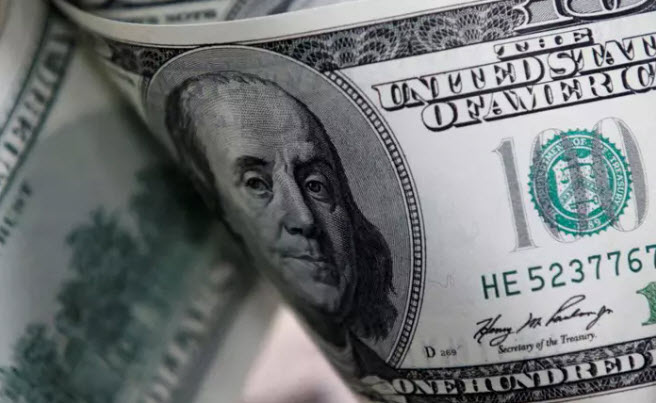(Reuters) – The dollar rose to a two-week high versus the yen on Wednesday, lifted by higher Treasury yields as global inflation worries flared anew.
The dollar index, which measures the currency against six major peers, including Japan’s, rose 0.29% to 102.05, extending a 0.38% rally from Tuesday, when data showed euro-area consumer inflation soaring to a record.
The greenback climbed 0.42% to 129.22 yen, and earlier touched 129.295 for the first time since May 18.
Benchmark 10-year Treasury yields touched 2.884% overnight, the highest since May 19.
The euro slipped 0.26% to $1.0706, continuing its retreat from the more-than-one-month peak of $1.0787 hit on Monday after the European Central Bank shifted to a more hawkish posture.
The dollar index swooned to a one-month low of 101.29 on Monday after pulling back from a nearly two-decade high above 105 reached in mid-May, as U.S. inflation and other economic indicators showed signs of peaking amid the Federal Reserve’s aggressive policy tightening.
Markets have priced half-point interest rate rises for the Fed’s meetings this month and next, in line with what policymakers have been signalling, but the outlook beyond that is murky.
A monthly U.S. jobs report due on Friday may offer new clues.
“It’s still too early to call a long-term DXY peak,” Westpac strategists wrote in a client note, referring to the dollar index.
“An aggressive 180bp in ECB rate hikes are priced through to end-2023, about the same as the Fed, yet it’s hard to see the ECB moving toe to toe.”
The dollar index could range between 101 and 105 for “a while” before its bull trend resumed, they wrote.
Elsewhere, sterling sank 0.21% to $1.2577, adding to a 0.4% slide from Tuesday as Britain’s murky growth outlook and uncertain interest rate trajectory continued to weigh on sentiment.
The Aussie dollar weakened 0.13% to $0.7169, and New Zealand’s currency slumped 0.35% to $0.6492.
The U.S. dollar rose 0.15% to C$1.2669 ahead of the Bank of Canada’s rate-setting meeting later on Wednesday, with a half-point increase widely expected.
TD Securities strategists see Canada’s loonie stuck in a C$1.26-1.30 range versus the greenback through the summer.
“Global factors remain a crucial driver, limiting the impact of the anticipated 50bp hike,” they wrote in a research note.
“For now, CAD is more attractive on the crosses where we remain short versus NOK and like scaling into shorts versus AUD.”




